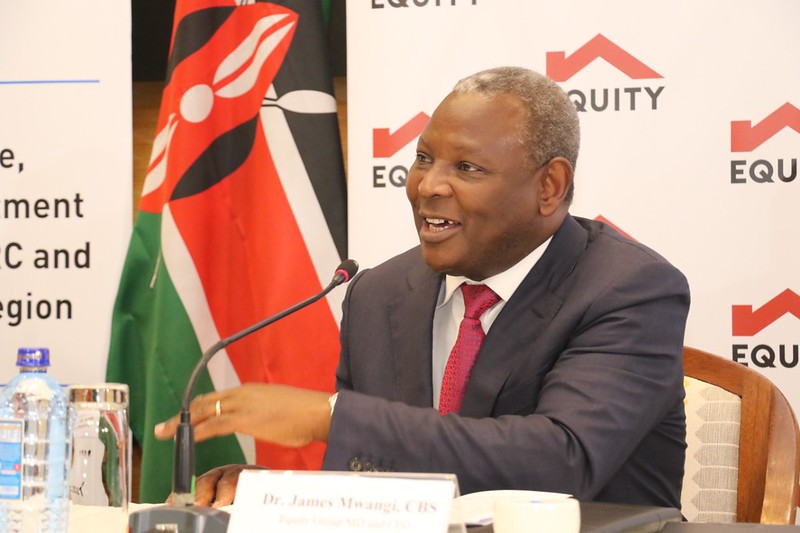Equity Group has received the Central Bank of Kenya (CBK) approval to charge customers a maximum of 18.5 per cent on loans under its risk-based pricing model.
Group Chief Executive James Mwangi said the risk-based pricing formula allows it to price loans at between 13 per cent and 18.5 per cent.
He was speaking Monday during the launch of its Kshs. 678 billion (USD 6 Billion) Regional Private Sector Economic Recovery and Resilience Stimulus Plan.
“We now have no excuse of leaving anybody behind because we can price risk within a reasonable range,” said Mwangi.
“We have chosen to be open and transparent, so it is one interest rate that encompasses all what we used to have previously as fees, loan appraisal fees and all that. All this will be in one annualised interest rate.”
In February 2019, the CBK published the Kenya Banking Sector Charter that requires a commitment from banks to entrench a responsible and disciplined banking sector, cognizant of, and responsive to, the needs of their customers.
In January 2022, Dr Patrick Njoroge, CBK Governor disclosed that loan pricing models that had been received from lenders were not sufficient enough.
“We required banks to redo their business models so as to deliver on this. They have been discussing with us what their modelling is and how they will implement it,” said CBK Governor Patrick Njoroge.
“If they don’t show how their homework is done then we send them home to come up with or explain their workings. We have done that with all of them… they need to do it to our satisfaction.”
Equity bank becomes the first lender to announce new loan pricing, following the repeal of the interest rate cap in November 2019.
According to Sterling Capital Research, Equity bank’s model takes into account the Group’s base rate, cost of funds, Return on Assets (ROA), Operating Expenses (OPEX) and adds a risk premium to the same.
“The Group’s yields on loans stood at 11.8 per cent (as at Q3’2021) and this news will result in an increase in the above and subsequently Net interest margins (NIMs) going forward. We estimate Equity’s yields on loans at 11.8 per cent – 12 per cent for FY2021 and +12 per cent FY2022 due to the impact of risk-based loan pricing,” Sterling Capital states.
Effect on the banking sector
“The news signals a rise in domestic debt interest rates with the Government now having to compete with the private sector for bank capital. We expect private sector credit (PSC) growth to improve going forward, with a high likelihood of it exceeding the double-digit range in the cause of the year as businesses have greater access to credit.
Banks are likely to increase lending significantly which on the back of higher interest rates being charged will translate into higher interest income. We rate the possibility of the resumption of banking charges that were suspended in the wake of the Covid-19 pandemic as moderate a scenario that would bolster Non-Funded Income (NFI).
These two pieces of news combined means higher earnings for banks going forward which we expect to act as a catalyst that will return activity into the NSE as investors’ price this news into share prices.”
Commentary from Sterling Capital
Khusoko is now on Telegram. Click here to join our channel and stay updated with the latest East African business news and updates.




